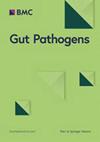在天牛肠杆菌感染过程中,微生物群促进了盲肠巨噬细胞的招募和促炎反应
IF 4.3
3区 医学
Q1 GASTROENTEROLOGY & HEPATOLOGY
引用次数: 0
摘要
艾美耳球虫属属于顶复合体寄生虫门,是球虫病的罪魁,球虫病是一种对家禽生产产生重大经济影响的肠道疾病。柔嫩艾美耳球虫是鸡中最毒的一种。在之前的一项研究中,我们发现盲肠菌群对这种感染的生理病理有负面影响。然而,微生物群导致生理病理的机制仍未确定。巨噬细胞在炎症过程中发挥关键作用,但它们与软毛杆菌感染期间微生物群的相互作用从未被研究过。因此,我们研究了在tenella感染期间微生物群对巨噬细胞的影响。用KUL01抗体免疫荧光染色法检测未感染、无菌感染和常规感染鸡盲肠组织中的巨噬细胞。对盲肠细胞进行分离、染色、分析和分类,采用高通量qPCR检测其基因表达。我们证明了微生物群对于在E. tenella感染中招募盲肠巨噬细胞是必不可少的。此外,微生物群促进了巨噬细胞的促炎转录组特征,其特征是感染鸡中NOS2、ACOD1、PTGS2、TNFα、IL1β、IL6、IL8L1、IL8L2和CCL20基因表达增加。将传统鸡的盲肠菌群注射到无菌感染鸡中,部分恢复了巨噬细胞的募集和反应。综上所述,这些结果表明微生物群通过巨噬细胞的募集和激活增强了这种感染的生理病理。因此,涉及调节肠道微生物群的策略可能导致巨噬细胞介导的炎症反应的衰减,从而限制该疾病的负面临床结果。本文章由计算机程序翻译,如有差异,请以英文原文为准。
Microbiota promotes recruitment and pro-inflammatory response of caecal macrophages during E. tenella infection
Eimeria genus belongs to the apicomplexan parasite phylum and is responsible for coccidiosis, an intestinal disease with a major economic impact on poultry production. Eimeria tenella is one of the most virulent species in chickens. In a previous study, we showed a negative impact of caecal microbiota on the physiopathology of this infection. However, the mechanism by which microbiota leads to the physiopathology remained undetermined. Macrophages play a key role in inflammatory processes and their interaction with the microbiota during E. tenella infection have never been investigated. We therefore examined the impact of microbiota on macrophages during E. tenella infection. Macrophages were monitored in caecal tissues by immunofluorescence staining with KUL01 antibody in non-infected and infected germ-free and conventional chickens. Caecal cells were isolated, stained, analyzed and sorted to examine their gene expression using high-throughput qPCR. We demonstrated that microbiota was essential for caecal macrophage recruitment in E. tenella infection. Furthermore, microbiota promoted a pro-inflammatory transcriptomic profile of macrophages characterized by increased gene expression of NOS2, ACOD1, PTGS2, TNFα, IL1β, IL6, IL8L1, IL8L2 and CCL20 in infected chickens. Administration of caecal microbiota from conventional chickens to germ-free infected chickens partially restored macrophage recruitment and response. Taken together, these results suggest that the microbiota enhances the physiopathology of this infection through macrophage recruitment and activation. Consequently, strategies involving modulation of the gut microbiota may lead to attenuation of the macrophage-mediated inflammatory response, thereby limiting the negative clinical outcome of the disease.
求助全文
通过发布文献求助,成功后即可免费获取论文全文。
去求助
来源期刊

Gut Pathogens
GASTROENTEROLOGY & HEPATOLOGY-MICROBIOLOGY
CiteScore
7.70
自引率
2.40%
发文量
43
期刊介绍:
Gut Pathogens is a fast publishing, inclusive and prominent international journal which recognizes the need for a publishing platform uniquely tailored to reflect the full breadth of research in the biology and medicine of pathogens, commensals and functional microbiota of the gut. The journal publishes basic, clinical and cutting-edge research on all aspects of the above mentioned organisms including probiotic bacteria and yeasts and their products. The scope also covers the related ecology, molecular genetics, physiology and epidemiology of these microbes. The journal actively invites timely reports on the novel aspects of genomics, metagenomics, microbiota profiling and systems biology.
Gut Pathogens will also consider, at the discretion of the editors, descriptive studies identifying a new genome sequence of a gut microbe or a series of related microbes (such as those obtained from new hosts, niches, settings, outbreaks and epidemics) and those obtained from single or multiple hosts at one or different time points (chronological evolution).
 求助内容:
求助内容: 应助结果提醒方式:
应助结果提醒方式:


